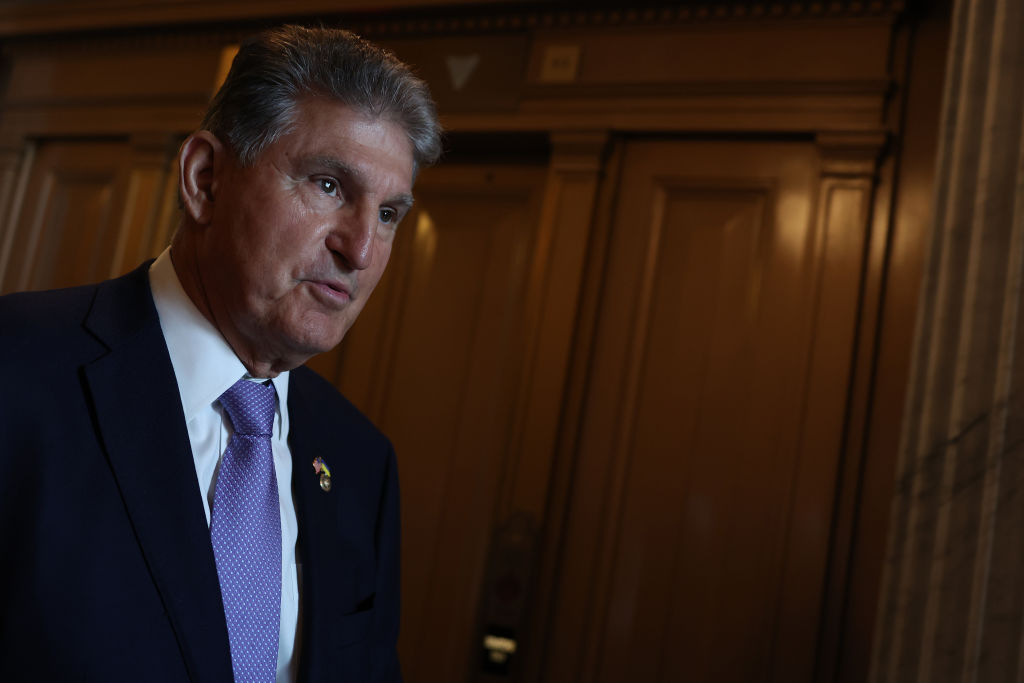Manchin and Schumer reach agreement on clean energy


A free daily email with the biggest news stories of the day – and the best features from TheWeek.com
You are now subscribed
Your newsletter sign-up was successful
Sen. Joe Manchin (D-W.Va.) announced on Wednesday that he and Senate Majority Leader Chuck Schumer (D-N.Y.) had reached an agreement on a reconciliation bill that represents a pared-down version of President Biden's Build Back Better agenda.
Punchbowl News founder Jake Sherman reported that the reconciliation bill — which requires only 51 votes to pass — "deals with climate, energy, tax[es], and healthcare." According to The Washington Post, the legislation, known as the Inflation Reduction Act of 2022, includes "roughly $433 billion in new investments, much of which is focused on climate change and energy production."
Manchin pulled out of a similar deal earlier this month, citing concerns that new climate spending could exacerbate the ongoing inflation crisis. That agreement represented a renewed attempt to pass key parts of BBB after Manchin said in December that he wouldn't vote for the whole package. According to The New York Times, this second failure infuriated Democrats, who had spent more than a year working to "scale back, water down, trim and tailor" the $1.75 trillion BBB agenda to "Manchin's exact specifications."
The Week
Escape your echo chamber. Get the facts behind the news, plus analysis from multiple perspectives.

Sign up for The Week's Free Newsletters
From our morning news briefing to a weekly Good News Newsletter, get the best of The Week delivered directly to your inbox.
From our morning news briefing to a weekly Good News Newsletter, get the best of The Week delivered directly to your inbox.
On Monday, six Democratic staffers were arrested for protesting outside Schumer's office, urging him to bring Manchin back to the table.
In a statement released Wednesday, Manchin declared BBB "dead" once and for all. He also insisted that the Inflation Reduction Act would not "make the United States more dependent on foreign energy" or move "the country closer to the unstable and vulnerable European model of energy."
A free daily email with the biggest news stories of the day – and the best features from TheWeek.com
Grayson Quay was the weekend editor at TheWeek.com. His writing has also been published in National Review, the Pittsburgh Post-Gazette, Modern Age, The American Conservative, The Spectator World, and other outlets. Grayson earned his M.A. from Georgetown University in 2019.
-
 The environmental cost of GLP-1s
The environmental cost of GLP-1sThe explainer Producing the drugs is a dirty process
-
 Greenland’s capital becomes ground zero for the country’s diplomatic straits
Greenland’s capital becomes ground zero for the country’s diplomatic straitsIN THE SPOTLIGHT A flurry of new consular activity in Nuuk shows how important Greenland has become to Europeans’ anxiety about American imperialism
-
 ‘This is something that happens all too often’
‘This is something that happens all too often’Instant Opinion Opinion, comment and editorials of the day
-
 House votes to end Trump’s Canada tariffs
House votes to end Trump’s Canada tariffsSpeed Read Six Republicans joined with Democrats to repeal the president’s tariffs
-
 Bondi, Democrats clash over Epstein in hearing
Bondi, Democrats clash over Epstein in hearingSpeed Read Attorney General Pam Bondi ignored survivors of convicted sex offender Jeffrey Epstein and demanded that Democrats apologize to Trump
-
 El Paso airspace closure tied to FAA-Pentagon standoff
El Paso airspace closure tied to FAA-Pentagon standoffSpeed Read The closure in the Texas border city stemmed from disagreements between the Federal Aviation Administration and Pentagon officials over drone-related tests
-
 Judge blocks Trump suit for Michigan voter rolls
Judge blocks Trump suit for Michigan voter rollsSpeed Read A Trump-appointed federal judge rejected the administration’s demand for voters’ personal data
-
 US to send 200 troops to Nigeria to train army
US to send 200 troops to Nigeria to train armySpeed Read Trump has accused the West African government of failing to protect Christians from terrorist attacks
-
 Grand jury rejects charging 6 Democrats for ‘orders’ video
Grand jury rejects charging 6 Democrats for ‘orders’ videoSpeed Read The jury refused to indict Democratic lawmakers for a video in which they urged military members to resist illegal orders
-
 Judge rejects California’s ICE mask ban, OKs ID law
Judge rejects California’s ICE mask ban, OKs ID lawSpeed Read Federal law enforcement agents can wear masks but must display clear identification
-
 Lawmakers say Epstein files implicate 6 more men
Lawmakers say Epstein files implicate 6 more menSpeed Read The Trump department apparently blacked out the names of several people who should have been identified
